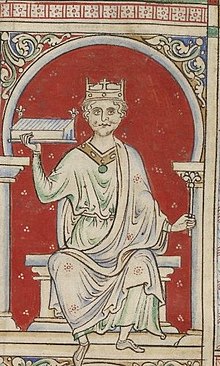
Back Вилгелм II (Англиа акрал) Abkhazian Willem II van Engeland Afrikaans Willelm II Engla Cyning ANG وليام الثاني (ملك إنجلترا) Arabic ويليام التانى ARZ ایکینجی ویلیام (اینگیلیس) AZB Вильгельм II (Англия короле) Bashkir Вільгельм II Руды Byelorussian Уилям II (Англия) Bulgarian Gwilherm II (Bro-Saoz) Breton
| William II | |
|---|---|
 Miniature from Matthew Paris's Historia Anglorum, c. 1253 | |
| King of England | |
| Reign | 26 September 1087 – 2 August 1100 |
| Coronation | 26 September 1087[1] |
| Predecessor | William I |
| Successor | Henry I |
| Born | c. 1057 Normandy, Kingdom of France |
| Died | 2 August 1100 (aged approximately 43–44) New Forest, Hampshire, England |
| Burial | |
| House | Normandy |
| Father | William the Conqueror |
| Mother | Matilda of Flanders |
William II (Anglo-Norman: Williame; c. 1057 – 2 August 1100) was King of England from 26 September 1087 until his death in 1100, with powers over Normandy and influence in Scotland. He was less successful in extending control into Wales. The third son of William the Conqueror, he is commonly referred to as William Rufus (Rufus being Latin for "the Red"), perhaps because of his ruddy appearance or, more likely, due to having red hair.[2][a]
William was a figure of complex temperament, capable of both bellicosity and flamboyance. He did not marry nor have children, which – along with contemporary accounts – has led some historians to speculate on homosexuality or bisexuality.[4] He died after being hit by an arrow while hunting. Circumstantial evidence in the behaviour of those around him – including his younger brother Henry I – raises strong, but unproven, suspicions of murder.[5][6] Henry I hurriedly succeeded him as king.
Historian Frank Barlow observed William was "[a] rumbustious, devil-may-care soldier, without natural dignity or social graces, with no cultivated tastes and little show of conventional religious piety or morality – indeed, according to his critics, addicted to every kind of vice, particularly lust and especially sodomy." On the other hand, he was a wise ruler and victorious general. Barlow noted, "His chivalrous virtues and achievements were all too obvious. He had maintained good order and satisfactory justice in England and restored good peace to Normandy. He had extended Anglo-Norman rule in Wales, brought Scotland firmly under his lordship, recovered Maine, and kept up the pressure on the Vexin."[7]
- ^ Tout, An Advanced History of Great Britain from the Earliest Times to 1918, p. 94
- ^ Barlow 2000, pp. 11–12.
- ^ Mason, King Rufus: The Life and Murder of William II of England, p. 10
- ^ Mason, King Rufus: The Life and Murder of William II of England, p. 16
- ^ Mason, King Rufus: The Life and Murder of William II of England, pp. 9–11
- ^ Cripps, T. (2023). "William II (Rufus)". Historic UK. Retrieved 13 December 2022.
He died not long after. It has been argued that his death was an assassination plot by his brother Henry, who not long after his older brother's death, raced to...
- ^ Barlow, Frank (2004). "William II (c.1060–1100)". Oxford Dictionary of National Biography. Oxford Dictionary of National Biography (online ed.). Oxford University Press. Retrieved 28 November 2013. (Subscription or UK public library membership required.)
Cite error: There are <ref group=lower-alpha> tags or {{efn}} templates on this page, but the references will not show without a {{reflist|group=lower-alpha}} template or {{notelist}} template (see the help page).
© MMXXIII Rich X Search. We shall prevail. All rights reserved. Rich X Search